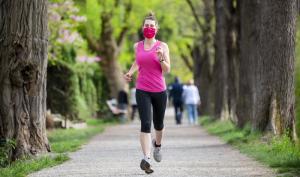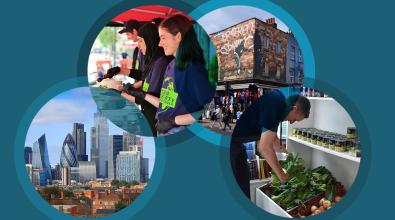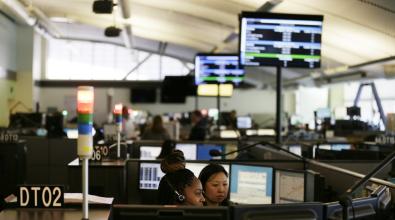Why self-care is critical to any city leader’s COVID-19 plan

For mayors and their staff, the many stresses of 2020 keep piling up. They’re not only responding to a health calamity and economic collapse, they’re quelling unrest in the streets and on their doorsteps, reckoning with racial injustice, and navigating budget cuts, tensions with other levels of government, and fights over mask-wearing. And that’s not even counting their often-upended lives at home.
It’s no wonder nearly everyone working in city hall feels wiped out. A recent survey of 385 local government officials and staff across the U.S. found morale to be suffering widely in large and small jurisdictions alike. It’s more important than ever that mayors and managers find ways to take care of themselves and the people who work for them.
The nature of stress local leaders are feeling is evolving, said Dr. Kimberlyn Leary, a clinical psychologist who teaches public leadership at Harvard Kennedy School and Harvard Medical School/McLean. And the sources of stress are compounding as the pandemic collides with economic turbulence and racial unrest.
“March and April presented mayors with an immediate, urgent, and in some ways new set of stresses,” Leary said. “Now, we’re in a period of what we might think of as chronic stress. Stress accumulates over time. And so it’s not surprising that mayors and their staff are feeling increased pressure.”
For city leaders, Leary said, it’s critical to prioritize self-care and model that behavior for staff. That starts with developing a “sacred routine” of activities that one finds replenishing, whether that’s taking a walk, meditation, playing with a pet, reading, getting out in nature, or something else. Leaders also must remember that their employees are under intense and evolving pressures, too.
“People who are used to working under urgent conditions like mayors — that just becomes their new normal,” Leary said. “And they sometimes forget that this is hard for people, and remains hard. It’s useful for mayors to look at the stresses their staff and their communities are under with fresh eyes: If they were just tuning into the show right now, what would they see? If you’re a parent of a teenager of color, you may be thinking differently about the range of talks you have with your child now than you were back in March.”
[Get the City Hall COVID-19 Update. Subscribe here.]
Across the country, mayors are finding their own ways to cope.
For Dayton, Ohio, Mayor Nan Whaley, chronic stress isn’t new to 2020 — it started for her last year when tornadoes hit her city in June and a mass shooting occurred in August. Whaley has been seeing a counselor every other week since then — online since COVID hit — and talks about that publicly as a way of encouraging others to seek help, too.
“Having somebody that you can talk to freely is something that is really, really important for a leader,” Whaley said. “As mayor, there’s only one of you in the community. Just having that time for me to assess what’s going on in the job and what’s going on with me emotionally, makes me a stronger leader.”
In addition, Whaley starts her day with yoga every morning, following the popular “Yoga With Adrienne” on YouTube from her living room. Generally, she’s sticking to a routine of working mornings from home and afternoons from city hall, and encourages her staff to do the same. “I know that if I’m going 100 miles per hour, then my staff wants to go 100 miles per hour to keep up with me,” Whaley said. “Considering that most of the people who work for me are women who are trying to manage childcare issues, that is not a sustainable way for us to go. I’m encouraging them to take whatever they need. Because the kids stuff — that’s what is overwhelming people in this time of COVID.”
Setting a routine has also been critical for Providence, R.I., Mayor Jorge Elorza, who said he’s paying attention to getting up early each day, working out, eating well, and getting sleep. He’s also giving himself and his team more flexibility around internal deadlines. “The times we make decisions we regret are times when we feel as though we’re under pressure; they’re decisions we make when we’re angry or upset or distracted or tired,” Elorza said.
“As head of our organizations, the entire team feeds off the energy the mayor brings,” he continued. “And so if you’re taking care of yourself and you’re approaching the job with the right frame of mind, that’s going to work its way down and the team around you is going to take their cues.”
For Augusta, Ga., Mayor Hardie Davis, the key to coping is setting aside 15 minutes a day for reflection, what he calls his “recalibration time.” It’s a moment when Davis thinks about things he and his team have done well or things that might not have gone as planned, and thinks ahead to what’s coming in the days ahead.
“The recalibration time allows me to prioritize self-care, mindfulness and restoration,” Davis said. “I’ve utilized this time to recharge via prayer, meditation, quiet uninterrupted moments and music. This allows me to focus and sit with what I may be feeling or experiencing each day. Though it may only be a few minutes, the benefit has proved to be a great asset to my mental health as we navigate through a time in our lives that none of us have ever faced before.”
[Read: Boosting mental health during a pandemic: 4 things mayors can do]
Boise Mayor Lauren McLean recharges her batteries on the many nature trails around Idaho’s capital city. An avid trail runner, she’d rather prepare for debates or speeches while running than sitting at a computer. And she’s shown up for more than one Zoom meeting still wearing her running clothes, something she hopes sends a message to staff to squeeze their workouts in whenever they can.
McLean said mountain biking has also been a great way to spend time with her teenage son and husband, away from her phone. “We get out in the evenings, chasing the setting sun,” McLean said. “Outside time centers me, gives me a chance to see people also trying to take care of themselves through these tough times, and keeps me healthy and focused.”
Mayors with school-aged children face particular challenges finding a work-life balance, especially now with school starting up virtually in so many places. That’s what Joe Goethals, the mayor of San Mateo, Calif., and father of girls aged 12, 10, and 5, has going on. Back in May, Goethals said, he reached a point of exhaustion where he couldn’t get out of bed. He left his day job as a deputy district attorney, and started a new career because “that was the only way I could take back control of my life.”
With so many pressures in both public and private life, Goethals said he tries to make sure that he and his family stay focused on the basics, each and every day. “We have a sticker chart in our kitchen now,” he said. “Every day, all of us in the family have to do five things. We’ve got to make our beds. We’ve got to eat and sleep well. We’ve got to exercise. We’ve got to read. And we have to be thankful. And we make sure that by the time we’re eating dinner at night, that we’ve done all of those things.”
How to know you’re stressed
Use this checklist from Harvard’s Dr. Kimberlyn Leary to recognize when you’re stressed so you can respond to it:
- Thinking: Being easily distracted, unable to concentrate.
- Emotions: Trouble relaxing, feeling irritable
- Body: Increase of decrease of energy, feeling restless, sweating, headaches, appetite and sleep changes
- Behavior: Blaming others or getting into frequent arguments
(Shutterstock photo)


